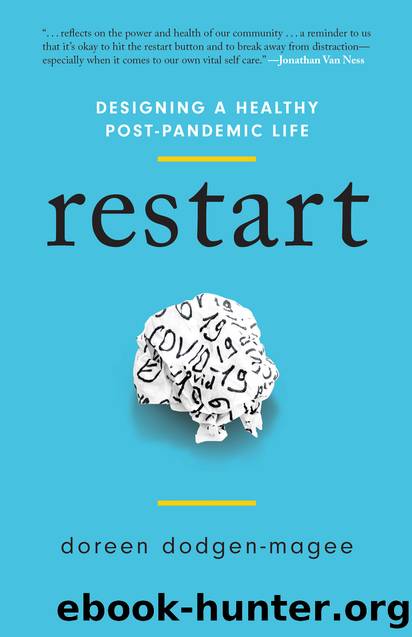Restart by Doreen Dodgen-Magee

Author:Doreen Dodgen-Magee [Dodgen-Magee, Doreen]
Language: eng
Format: epub
Publisher: Rowman & Littlefield Publishers
Published: 2021-08-08T00:00:00+00:00
DEALING WITH OVERWHELMING EMOTIONS AND TEACHING SELF-SOOTHING
When we feel overwhelmed itâs easy to become dysregulated. Our heart speeds up, we feel agitated or âjumpy,â we canât think clearly, and our emotions are right at the surface. Sometimes the opposite happens and we shut down, we canât breathe well, and our minds go blank. Whichever way we, or our children, go, itâs a difficult reality to live through.
One of the ways that we use to get back to a sense of ânormalâ is by having freedom to leave situations that overwhelm us and get into spaces that help us feel calm. We reach out to someone who will listen or help us laugh. We run errands or shoot hoops or do whatever our calendar reminds us weâve committed to and, over time, we find ourselves coming back to center. In this time of shutdown, we havenât gotten to do these things, and weâre all less regulated than ever as a result.
This is a scary and uncomfortable state of being for children ⦠especially when they have little control. They feel the full weight of their feelings but sometimes donât have language or skills to express them. They feel stimulation will actually calm them so they seek it out nonstop. Theyâre ânot tiredâ (they are never tired) when we can clearly see that they can barely keep their eyes open. Their overwhelm causes them to feel vulnerable, which can make it very tricky for them to want to acknowledge. Even if they did, COVID-19 has left them bereft of ways of working through it.
Children have been sheltering with a fixed number of people in only a few spaces, which has severely limited the options they have for getting their feet under them when overwhelmed. Theyâve missed out on a lot of the kinds of physical and social activities that would normally offer them release, and there arenât many non-digital distractions within their reach.
Itâs important to note that long before the pandemic had us relying on our screens for nearly everything, our devices were shown to create high levels of emotional and physiological dysregulation. This means that too much time with a screen can leave us feeling overstimulated and jittery, agitated and out of touch with our bodies. Weâve acclimated to such high levels of stimulation, however, that we feel overwhelmed when we try to step away from it. Especially for kids, theyâre damned if they do and damned if they donât.
For far too long weâve substituted stimulation for soothing. Weâve told ourselves that a couple of hours gaming, or Pinterest, movies, videos, or scrolling through social media at the end of the day âcalms us down.â In reality, however, all it does is distract us from our disease and reinforce the reality that we donât have what we need to comfort or regulate ourselves on our own. This is especially true for children.
If I want to run a race and my stomach is empty, I could make the choice to guzzle a bottle of water to make it feel full and stop growling.
Download
This site does not store any files on its server. We only index and link to content provided by other sites. Please contact the content providers to delete copyright contents if any and email us, we'll remove relevant links or contents immediately.
Zero to IPO: Over $1 Trillion of Actionable Advice from the World's Most Successful Entrepreneurs by Frederic Kerrest(4570)
Machine Learning at Scale with H2O by Gregory Keys | David Whiting(4313)
Never by Ken Follett(3957)
Harry Potter and the Goblet Of Fire by J.K. Rowling(3857)
Ogilvy on Advertising by David Ogilvy(3622)
Shadow of Night by Deborah Harkness(3368)
The Man Who Died Twice by Richard Osman(3079)
Book of Life by Deborah Harkness(2939)
The Tipping Point by Malcolm Gladwell(2922)
Will by Will Smith(2920)
Purple Hibiscus by Chimamanda Ngozi Adichie(2854)
0041152001443424520 .pdf by Unknown(2846)
My Brilliant Friend by Elena Ferrante(2831)
How Proust Can Change Your Life by Alain De Botton(2814)
How to Pay Zero Taxes, 2018 by Jeff A. Schnepper(2655)
Hooked: A Dark, Contemporary Romance (Never After Series) by Emily McIntire(2554)
Rationality by Steven Pinker(2364)
Can't Hurt Me: Master Your Mind and Defy the Odds - Clean Edition by David Goggins(2341)
Borders by unknow(2315)
